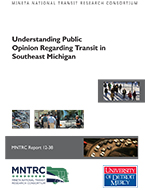Abstract:
This report presents findings from a study on public opinion regarding transit in Southeast Michigan. The overall goals of this study were to assess the nature of public opinion regarding regional transit and to understand its relation to socio-demographic characteristics, political attitudes and orientations, and geographical characteristics of respondents. Results from the study were interpreted toward the identification of key recommendations for building a positive public opinion regarding transit in future transit initiatives in Southeast Michigan. The project consisted of three phases – Phase 1: a pilot mail survey; Phase 2: an educational effort; and Phase 3: a comprehensive phone and email survey. In the last phase, an ad hoc survey was designed based on the review of past public opinion surveys, local media coverage on public opinion about transit,1 and previous educational campaigns. A sample of 799 likely-voters in four counties of Southeast Michigan provided opinions for this project. Results provide insight on how public opinion relates to respondents’ socio-demographic, political, and geographical characteristics. In addition, a set of recommendations on how to enhance the success of future campaign initiatives and public opinion efforts for the Metro Detroit region and comparable regions is also provided. Key elements for such efforts include public education about transit, clarity about transit funds spending, accountability measures, and transparency of transit plans and decision-making processes. Specific recommendations for campaign messaging for Southeast Michigan are also included in this report.
Authors:
CLAUDIA BERNASCONI, M. ARCH., M. DES
Claudia Bernasconi is a registered architect in the European Union and an associate professor of architecture at University of Detroit Mercy. Her research focuses on preferences, attitudes and behaviors of riders/non-riders toward transportation systems. She has worked on several transit-related funded projects. Recent studies focused on public opinion regarding transit, public perception of transportation corridors and pedestrian transportation, on walkability, and on design and perception of automated transportation systems. Methods employed in her work combine approaches from the fields of environmental psychology and aesthetics, survey techniques, and urban landscape evaluation techniques. Her work has been published in journals, such as the Journal of Management and Sustainability, the Landscape and Urban Planning Journal, and conference proceedings of the Environmental Design Research Association, the Council of Educators in Landscape Architecture, and Automated People Mover conference.
XIAOHUI ZHONG, PH.D.
Dr. Xiaohui Zhong is a professor of mathematics of University of Detroit Mercy. Her main research expertise is in applied statistical analysis. During her tenure in UDM, she taught courses in Probability and Statistics for engineering, Mathematical Modeling, Mathematics of Finance, and Mathematical Thinking, with publications in Cost Analysis of Light Rail Transits, Analysis of Public Transit Opinion, Collaborative Recommendation Systems, and Behavior of Distractive Driving in Dilemma Zones. She is also the principal investigator and co-principal investigator of two major National Science Foundation grants.
LEO HANIFIN, D.E.
Dr. Leo Hanifin is a professor of mechanical engineering and the leader of research in transit and innovation at the University of Detroit Mercy (UDM). Previously, Dr. Hanifin was the Dean - College of Engineering and Science UDM from 1991-2012. From 2006-2012, he was the director of the Michigan Ohio (MIOH) University Transportation Center, a coalition of five universities supported by the US and Michigan Departments of Transportation. In one MIOH project, he led UDM faculty members from engineering and architecture, who partnered with Deloitte to develop the preliminary plan for the Woodward Transit Catalyst System (now M1 rail). He is a member of the M-1 Rail Board of Directors and the Citizens’ Advisory Committee of the Detroit Regional Transit Authority. He recently led of a team of more than 30 faculty members and students engaged in transit research, teaching, and K-12 outreach at UDM, as part of the Mineta National Transit Research Consortium.
LINDA H. SLOWIK, PH.D.
Dr. Slowik is an industrial/organizational (I/O) psychologist and an associate professor at the University of Detroit Mercy. In addition to teaching classes in I/O psychology, she teaches multivariate statistics, developmental psychology, and social psychology. Her research interests include the study of creativity, motivation, and the psychology of the environment. Her emphasis is to conduct interdisciplinary projects with the opportunity to apply and test psychological principles in nontraditional settings featuring real problems. Her current research activities involve work with research teams focused on problems in engineering, nursing, and underserved/underprivileged populations, as well as transit. Her work has been published in scholarly outlets such as the Journal of Organizational Behavior, Human Relations, the Journal of Occupational and Organizational Psychology, Journal of Environmental Psychology, and the Academy of Management Review.
MEGAN OWENS
Ms. Owens is executive director of Transportation Riders United, a non-profit organization that works to improve public transit in greater Detroit through education, engagement, and advocacy. As director of TRU, she has been leading on-the-ground transit education programs in the Southeast Michigan region for seven years.


